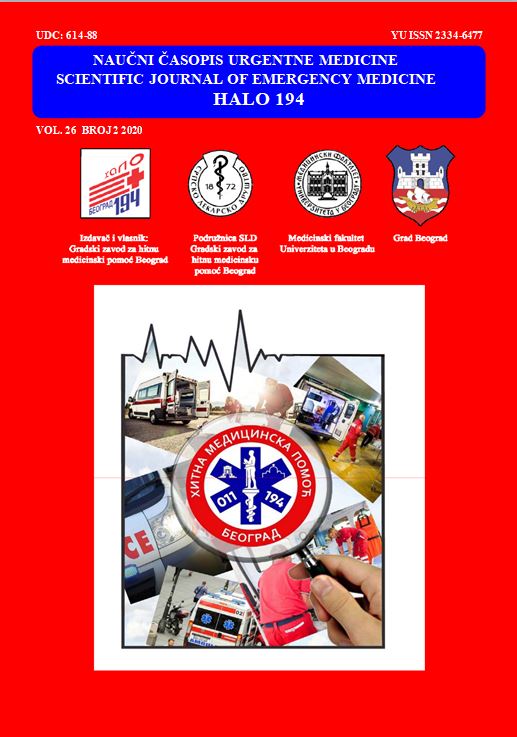NEPOŠTENJE U NAUCI
Sažetak
Formiranjem globalne računarske mreže, odnosno pojavom interneta, naučnicima ali i svima ostalima širom sveta, postale su dostupne razne informacije iz svih oblasti. Naučnici i stručna javnost moraju biti sigurni da su istraživanja njihovih kolega istinita, objektivna, a rezultati istraživanja kompletni. Ove karakteristike naučnog rada predstvaljaju naučno poštenje. Naučno nepoštenje može se javiti u različitim oblicima i u svim fazama naučno-istraživačkog procesa, a najčešće se javlja u vidu fabrikovanja, falsifikovanja i plagijarizma. Razlozi nepoštenja mogu da budu lični, profesionalni i finansijski. Posebno područje predstavlja “među zona” i nju čine manipulacija podacima i njihovo selekcionisanje, greške u citiranju referenci, višestruke i „salama“ publikacije, problematična autorstva. Pojava povrede naučno-istraživačkog kodeksa ruši ugled naučne zajednice, ali i dovodi u zabludu druge istraživače, što značajno usporava naučni razvoj. Digitalizacija i tehnološki napredak značajno doprinose brzom otkrivanju, eliminaciji i sankcionisanju bilo kojeg oblika zloupotebe istraživanja.
Reference
2. Vučković-Dekić Lj, Radulović S, Stanojević-Brkić N. Dobra naučna praksa–Etički kodeks naučnoistraživačkog rada. U: Vučković-Dekić Lj, Milenković P, Šobić V, urednici. Etika naučnog rada u biomedicini. Beograd: Akademija medicinskih nauka Srpskog lekarskog društva i Medicinski fakultet Univerziteta u Beogradu. 2002:161-173.
3. Fang FC, Steen RG, Casadevall A. Misconduct accounts for the majority of retracted scientific publications. Proceedings of the National Academy of Sciences. 2012;109(42):17028-17033. PMID: 23027971. DOI: 10.1073/pnas.1212247109.
4. Kuroki T. New Classification of Research Misconduct from the Viewpoint of Truth, Trust, and Risk. Account Res. 2018;25(7-8):404-408. PMID: 30427209. DOI: 10.1080/08989621.2018.1548283.
5. Djalalinia S, Owlia P, Afzali HM, Ghanei M, Peykari N. A proposed strategy for research misconduct policy: A review on misconduct management in health research system. Int J Prev Med. 2016;7:92. PMID: 27512558. DOI: 10.4103/2008-7802.186227
6. Shuchman M. False images top form of scientific misconduct. CMAJ. 2016;188(9):645. PMID: 27141032. doi: 10.1503/cmaj.109-5241.
7. Vaux DL. Scientific misconduct: falsification, fabrication, and misappropriation of credit. In: Bretag T. (eds) Handbook of Academic Integrity. Singapore: Springer. 2016:895-911. DOI: https://doi.org/10.1007/978-981-287-098-8_26.
8. Ding D, Nguyen B, Gebel K, Bauman A, Bero L. Duplicate and salami publication: a prevalence study of journal policies. Int J Epidemiol. 2020;49(1):281-288. PMID: 32244256. DOI: 10.1093/ije/dyz187.
9. Suqing LI. Who is innocent in authorship misconduct?. Dongwuxue Yanjiu. 2016;37(3):117-118. PMID: 27265648. doi: 10.13918/j.issn.2095-8137.2016.3.117.
10. Anđelić S, Banjac N, Čolaković G, Emiš-Vandlik N. Pisanje naučnog članka: UMRID formula. Naučni časopis urgentne medicine Halo 194. 2017;23(1):31-37.
11. Yadav S, Rawal G, Baxi M. Plagiarism-A serious scientific misconduct. Int J Health Sci Res. 2016;6(2):364-366.
12. Debnath J. Plagiarism: A silent epidemic in scientific writing–Reasons, recognition and remedies. Med J Armed Forces India. 2016;72(2):164-167. PMID: 27257327. DOI: 10.1016/j.mjafi.2016.03.010.
13. Vučković-Dekić Lj. Plagijarizam – najčešća naučna prevara. Naučni časopis urgentne medicine Halo 194. 2016;22(3): 370-377.
14. LaFollette MC. The Evolution of the “Scientific Misconduct” Issue: An Historical Overview (44535C). Proc Soc Exp Biol Med. 2000;224(4):211-215. PMID: 10964254. DOI: 10.1046/j.1525-1373.2000.22423.x.
15. Bretag T (Ed). Handbook of academic integrity. Singapore: Springer; 2016.
16. Al-Marzouki S, Roberts I, Marshall T, Evans S. The effect of scientific misconduct on the results of clinical trials: a Delphi survey. Contemp Clin Trials. 2005;26(3):331-337. PMID: 15911467. DOI: 10.1016/j.cct.2005.01.011.
17. George SL. Research misconduct and data fraud in clinical trials: prevalence and causal factors. Int J Clin Oncol. 2016;21(1):15-21. PMID: 26289019. DOI: 10.1007/s10147-015-0887-3.
18. Johnson DR, Ecklund EH. Ethical ambiguity in science. Sci Eng Ethics. 2016;22(4):989-1005. PMID: 26169696. DOI: 10.1007/s11948-015-9682-9.
19. Hwang WS, Ryu YJ, Park JH, Park ES, Lee EG, Koo JM, et al. Evidence of a pluripotent human embryonic stem cell line derived from a cloned blastocyst. Science. 2004;303(5664):1669-1674. PMID: 14963337. DOI: 10.1126/science.1094515.
20. Hwang WS, Roh SI, Lee BC, Kang SK, Kwon DK, Kim S, et al. Patient-specific embryonic stem cells derived from human SCNT blastocysts. Science. 2005;308(5729):1777-1783. PMID: 15905366. DOI: 10.1126/science.1112286.
21. Fusch PI, Ness LR, Booker JM, Fusch GE. The ethical implications of plagiarism and ghostwriting in an open society. The Journal of Social Change. 2017; 9(1): 55-63. doi:10.5590/JOSC.2017.09.1.04 Retrieved from http://scholarworks.waldenu.edu/jsc/vol9/iss1/4/
22. McCuen RH. The plagiarism decision process: The role of pressure and rationalization. IEEE Transactions on Education. 2008;51(2):152-156. Retrieved from: https://doi.org/10.1109/TE.2007.904601.
23. Horbach SP, Breit E, Mamelund SE. Organisational responses to alleged scientific misconduct: sensemaking, sensegiving, and sensehiding. Science and Public Policy. 2019 Jun 1;46(3):415-429. doi: 10.1093/scipol/scy068.
24. Ataie-Ashtiani B. World map of scientific misconduct. Sci Eng Ethics. 2018;24(5):1653-1656. PMID: 28653166. DOI: 10.1007/s11948-017-9939-6.
25. Pellegrini PA. Science as a matter of honour: How accused scientists deal with scientific fraud in Japan. Sci Eng Ethics. 2018;24(4):1297-1313. PMID: 28653168. DOI: 10.1007/s11948-017-9937-8.
26. Artino Jr AR, Driessen EW, Maggio LA. Ethical shades of gray: International frequency of scientific misconduct and questionable research practices in health professions education. Acad Med. 2019;94(1):76-84. PMID: 30113363. DOI: 10.1097/ACM.0000000000002412.
27. Hesselmann F. Punishing crimes of the mind: Sanctions for scientific misconduct as a case for the cultural theory of punishment. Theoretical Criminology. 2019;23(4):527-544. Retrieved from: https://doi.org/10.1177/1362480618756365.
28. Galbraith KL. Life after research misconduct: Punishments and the pursuit of second chances. J Empir Res Hum Res Ethics. 2017;12(1):26-32. PMID: 28220722. DOI: 10.1177/1556264616682568.
- Autori zadržavaju autorska prava i pružaju časopisu pravo prvog objavljivanja rada i licenciraju ga "Creative Commons Attribution licencom" koja omogućava drugima da dele rad, uz uslov navođenja autorstva i izvornog objavljivanja u ovom časopisu.
- Autori mogu izraditi zasebne, ugovorne aranžmane za neekskluzivnu distribuciju članka objavljenog u časopisu (npr. postavljanje u institucionalni repozitorijum ili objavljivanje u knjizi), uz navođenje da je članak izvorno objavljen u ovom časopisu.
- Autorima je dozvoljeno i podstiču se da postave objavljeni članak onlajn (npr. u institucionalni repozitorijum ili na svoju internet stranicu) pre ili tokom postupka prijave rukopisa, s obzirom da takav postupak može voditi produktivnoj razmeni ideja i ranijoj i većoj citiranosti objavljenog članka (Vidi Efekti otvorenog pristupa).

